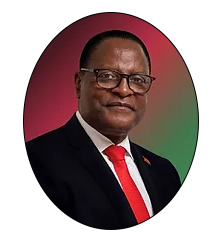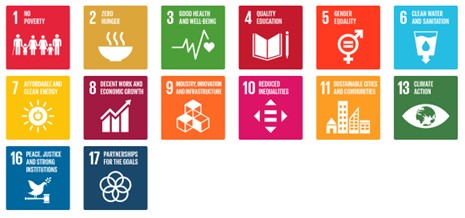President of Malawi to be guest of honor at agricultural conference
Dignitaries and academics will gather at agricultural conference organized by researchers from Malawi and MSU
The Malawi Agricultural Productivity and Commercialization Conference (MAPCC) on June 9-10 will host the President of Malawi as the guest of honor at the second annual event organized by the MwAPATA Institute, a Malawian agricultural policy research institute supported by the Michigan State University Feed the Future Innovation Lab for Food Security Policy Research, Capacity, and Influence (PRCI). The conference theme is Driving Agricultural Diversification in Support of the Aspirations of MW2063, the Malawi Vision 2063 plan, the goal of which is to build Malawian economic self-reliance and wealth so that by 2063 the African country will have a middle-income economy.
 His Excellency, Dr. Lazarus M. Chakwera, the State President of the Republic of Malawi, will preside as the guest of honor at the conference, showing governmental support for the importance of agricultural diversification and development. Dr. Thomas Munthali, the Director General of the National Planning Commission, will present the keynote address to the attendees.
His Excellency, Dr. Lazarus M. Chakwera, the State President of the Republic of Malawi, will preside as the guest of honor at the conference, showing governmental support for the importance of agricultural diversification and development. Dr. Thomas Munthali, the Director General of the National Planning Commission, will present the keynote address to the attendees.
PRCI director and Department of Agricultural, Food, and Resource Economics (AFRE) faculty, David Tschirley, will also be in attendance. “The fact that his Excellency the President of Malawi will open this conference speaks to the fantastic work being done by MwAPATA to generate robust empirical information and actively share it with public- and private stakeholders in the service of better policies and programs in Malawi.” Tschirley said, “We are proud to have been able to help start MwAPATA and to continue supporting it in its mission.”
The event will take place in Lilongwe, the capital city of Malawi, at the Bingu International Convention Center. It will also have an online component, through which global attendees can participate virtually. The organizers at MwAPATA have gathered a wide array of stakeholders in the agricultural sector for the conference, including governmental organizations and agencies, farmer’s organizations, philanthropic organizations, civil society, investors, entrepreneurs, the media, and academia. Building on the accomplishments of the initial conference, stakeholders will have opportunities to deliberate on how to overcome challenges and honor the achievements already made by the Malawian agricultural sector.
Bill Burke, Primary Investigator for MwAPATA, and Associate Professor in AFRE had this to say, “The fact that MwAPATA has grown and become influential in a relatively short time speaks volumes about the effort of everyone involved in starting the Institute. I have been lucky enough to see a number of local policy think tanks in action, and when I think about this combination of enthusiasm from local government and other stakeholders with the commitment from donors, I think we’re seeing something very special in Malawi.”
For Milu Muyanga, Associate Professor at MSU and MwAPATA Project Principal, the establishment of MwAPATA Institute has been both professionally and personally rewarding. Muyanga, who has been on a long-term assignment in Malawi since 2019 overseeing the establishment of MwAPATA Institute, says, “For the last 20 years I have been involved in agricultural policy work aimed at finding lasting solutions to rural poverty, inequality, and exclusion in sub-Saharan Africa. I felt that the establishment of MwAPATA Institute was in itself a big achievement in my policy research work. Personally, having come from a poor smallholder farming background, I feel that I have an obligation to contribute to lifting up the millions of poor smallholder farmers still trapped in poverty in Africa.”
In 2021 the MW2063 replaced the First Ten Year Malawi Implementation Plan (MIP1) as the next step in the plan to implement fourteen of the seventeen United Nations Sustainable Development Goals (SDGs). The SDGs were developed by the United Nations in 2015 with the ambitious goal of global peace, prosperity, and sustainability by 2030. While that goal may seem daunting, the SDGs were created with the understanding that these are key challenges for the coming decade. The aspirations of the MW2063 are steps along the way to overcoming these complex problems.

The first MAPCC conference theme was Supporting Agricultural Transformation in Malawi: Beyond Research to Implementation, which laid the groundwork for a focus on policy research dissemination to create transformational implementation throughout Malian agriculture. In this second annual event, the topic of agricultural transformation will continue to be pushed forward through possibilities for agricultural diversification.
The conference will include exhibitions, presentations and panel discussions focused on the first Pillar of the MW2063 document, which lays out goals for the optimization and commercialization of the agricultural sector. Focused investments in seven priorities are presented in the plan to create agricultural diversification in Malawi:
- Irrigation
- Anchor farms
- Farm inputs
- Mechanization
- Structured markets
- Agricultural research and innovation
- Dissemination of agricultural research findings
The first day of the two-day conference will focus on enhancing agricultural productivity. Topics such as adoption and access to improved agricultural inputs, appropriate technologies, innovations, and barriers to agricultural mechanization will be emphasized. The second day of the event will focus on enhancing structured agricultural market access with a focus on domestic and international markets and what needs to be done for high-value crops to move forward.
To attend the conference virtually:
Zoom ID: 859 7778 7379 || Passcode: 403923



 Print
Print Email
Email




